The new effort to replace the I-5 bridge between Portland and Vancouver is well underway. DOTs from Oregon and Washington are pouring money into an immense public outreach/PR campaign and planning process that is so slick it’s scary.
Along with hosting lots of advisory committee meetings and splashing content across multiple social media channels, the folks behind the Interstate Bridge Replacement Program effort have opened an online open house that includes the project’s first public survey.
Open now through March 1st, the survey includes several opportunities to make sure project leadership hears from bicycle riders, walkers, and micromobility vehicle users. This is extra important because as we’ve reported, the DOTs did not appoint a professional cycling advocate to the official advisory committee.
Advertisement
In the “Identifying Problems” sections, you can choose “Inadequate bike/ped path” as your top priority. There’s also a section where you can drag-and-drop a bike/ped icon to a map and leave a comment at a specific location. A ranking exercise titled “Community Values” allows you to rank your top three “Transit and Multimodal” priorities. (Strangely, that section has several choices that are essentially the same, which I worry could make it easier for things to appear unimportant.)
Take the survey and visit the online open house here.
— Jonathan Maus: (503) 706-8804, @jonathan_maus on Twitter and jonathan@bikeportland.org
— Get our headlines delivered to your inbox.
— Support this independent community media outlet with a one-time contribution or monthly subscription.



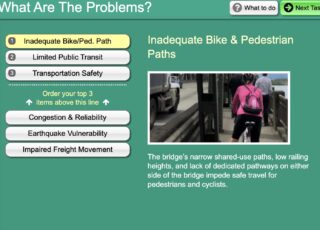
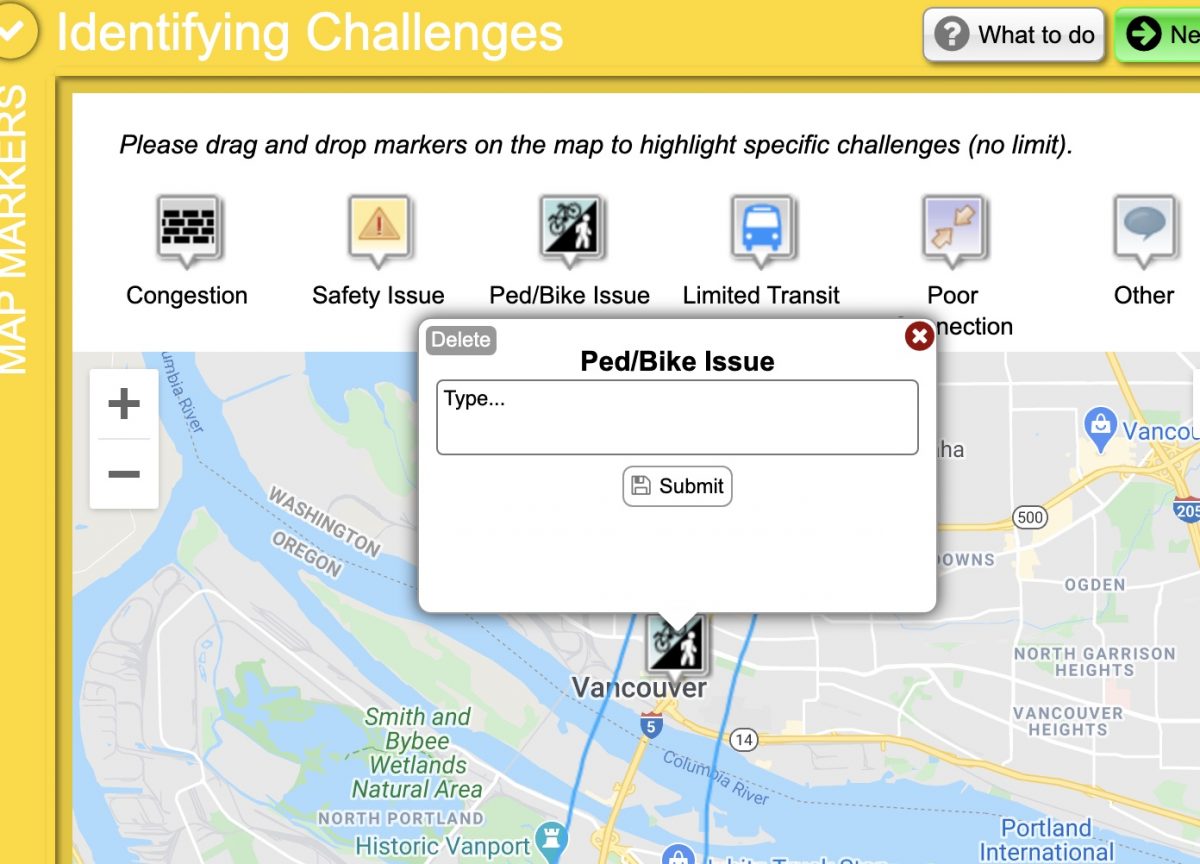
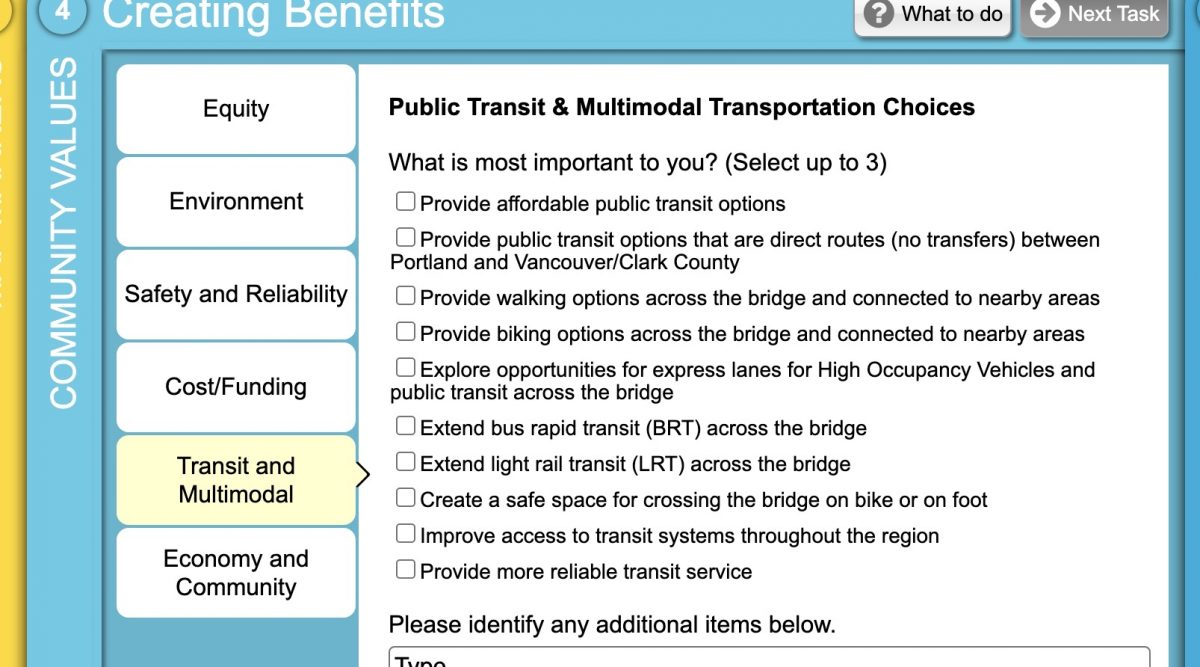
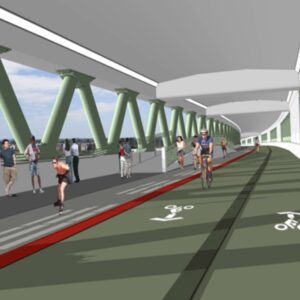
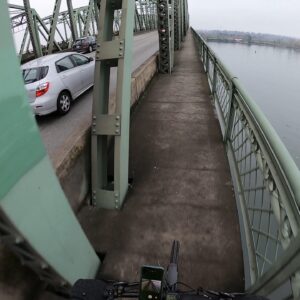
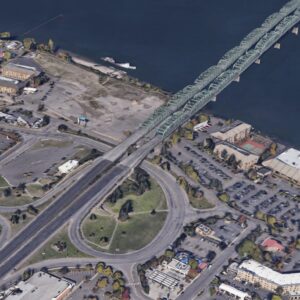

Thanks for reading.
BikePortland has served this community with independent community journalism since 2005. We rely on subscriptions from readers like you to survive. Your financial support is vital in keeping this valuable resource alive and well.
Please subscribe today to strengthen and expand our work.
Apart from the stupid duplicate topics/responses that you pointed out Jonathan, that survey mechanism was also a mess. I got to the end and literally couldn’t complete it because the height of the window was hard-coded and cut off the “submit final questions” button (see image)
Since I know how, I opened my browser inspector and overrode it, but given that this is apparently being run by a third-party (MetroQuest) that they must have paid money to, how was this not tested? They have an alternate “ADA Accessible” survey (which seems to work fine); why would they be using a non-accessible survey by default? Ugh.
For anyone who’s interested, here are the results so far on the ranking of problems. (Not sure why it shows “Your Rank” as blank; I definitely ranked these.) No surprise, “congestion and reliability” is at the top.
The site allows me to fill out the survey more than once from the same IP, computer, and browser.
Will they be publishing any data quality metrics, like generalized IP address location, anonomized browser fingerprint, so forth?
Edit – Never mind – when you’re done filling out the survey, refreshing the page takes you right back to the start, and you can fill out the survey again, and again, and again. The results of this survey are worthless. Any form that’s this trivial to exploit will be abused.
The quality of that survey really shows how little ODOT cares about feedback on this project. Our “progressive” Governor and legislature wants this car-only bridge built and no lowly citizen is going to stop them!
This feels like a website from 2002.
This is such a blatant attempt to manufacture consent. On many of the values, I didn’t agree with any of them. For instance – I don’t support tolling to increase project revenues and build a bigger bridge. That’s what they ask about. I do support tolling as a way to limit demand at peak periods, so we can either not build a bridge or not build a bigger bridge that is earthquake safe.
This is horrible public involvement that is designed to lead to a conclusion.
Latest results from a moment ago:
1. Congestion & Reliability – avg rank: 1.57 – times ranked – 2824
2. Earthquake Vulnerability – avg rank: 2.16 – times ranked – 1756
3. Impaired Freight Movement – avg rank – 2.25 – times ranked – 1138
4. Inadequate Bike/Ped. Path – avg rank – 2.11 – times ranked – 768
5. Limited Public Transit – avg rank – 2.01 – times ranked – 1362
6. Transportation Safety – avg rank – 2.25 – times ranked – 1725
I still can’t seem to shake that people don’t understand that this bridge will be for people in 2130…Are we really thinking that automobile congestion will still be our great grandchildren’s main concern? Eventually we’ll have to change how we get around not how much we get around, and this bridge should be ready for it…
The map suggests focusing on the I-5 near the Columbia River only (helping highway planners make the case that there are heaps of issues), but note you can drop pins anywhere.
For example, one could drop a pin on the Willamette River’s Marquam Bridge instead, and say something like:
> “The Marquam highway bridge – the first and last that Portlanders let a computer design – should never have passed aesthetic review.”
> “There is a strong risk that if highway planners are allowed to touch the iconic I-5 Columbia River Bridge, they will create an eyesore equal to this monstrosity.”
Rose Quarter expansion 2.0.
And guess what? surveys are biased, and transportation agencies make decisions based on their own best interests, politics, and what the people want, in that order.
They lost me at the second tab “Idenifying Problems.”